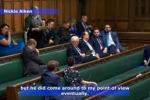
The article below was originally published in The Times Red Box on Monday 10 May.
The coronavirus pandemic has made the housing situation of millions all the more vulnerable. Despite evictions being banned, the risk of housing insecurity has increased as people have lost their jobs, fallen into arrears, and businesses have closed.
But this insecurity faced by renters in the private rented sector was present well before the pandemic.
I know this from personal experience. I have immediate family who have moved from the security of homeownership to the private rented sector.
Like many families in similar situations, the precarious nature of the sector is striking. Poor living standards and regulatory problems are an all-too-familiar reality for many renters. Even the best tenants have little protection from being ousted from the place that they call home.
It is unsettling that eviction can happen to virtually anyone through the powers of Section 21 notices. To put this into perspective, almost 3.2 million people say they have been forced to live in dangerous or unhealthy conditions because they fear that complaining to their landlord will trigger a retaliatory eviction.
It is time that we secure the private rented sector. We should seek to strengthen renters’ rights through the upcoming Renters’ Reform Bill. Good tenants must be able to feel that they can put down permanent roots in the place that they have chosen to call home.
The Bill which I hope to see revived in the Queen’s speech tomorrow has the opportunity to make a series of fundamental changes to help fix the problems faced by renters each day.
From the Onward roundtable discussion that I and my fellow Conservative MPs have had on the Bill, there are two clear priorities. First, it must ensure that tenants have the means of protection by removing the arbitrariness of evictions.
New YouGov polling shows that 76 percent of people think that landlords should not be able to evict tenants without giving an acceptable reason. Second, the bill must create a system less skewed in favour of landlords. The best way to achieve both is by abolishing Section 21, which was introduced in the 1988 Housing Act.
Since then, the private rented market has changed profoundly. Over the past 30 years, the private rented sector has doubled in size. Today it accommodates more than 11 million people, including 24 per cent of families with children. Renters pay on average 40 per cent of their take-home pay in rent, compared with 19 per cent for those with a mortgage, and yet have far less security in return. Whilst it is clear that the market has seen some seismic shifts, legislation has been slow to keep up or even respond to these changes.
Obviously building more homes will also help provide both tenants and prospective homeowners with security. I think we all recognise that we are not building enough homes and haven’t done so for a while. According to figures from Shelter, only 6,287 new social homes were built in 2018.
I am therefore pleased that the government is tackling the issue of housing supply head on. We build too little housing — social, affordable and private — to keep up with the demands of local populations. With the right support from government and partnerships with developers, local authorities and housing providers we can build more homes.
There is no better time for a Conservative government to intervene to help support those in the private rented sector. It is clear that tenants need greater protection and security. It is also very important to recognise that any changes should not take away from a landlord’s right to regain possession of their property when tenants are at fault.
The Renters’ Reform Bill can provide the foundations of secure and safe housing for millions of renters. The abolition of Section 21 is the start but we need to do more to support our renters to give people a stake in the property market and assure them with long-term security. As we emerge from lockdown, this will become even more important than ever.





